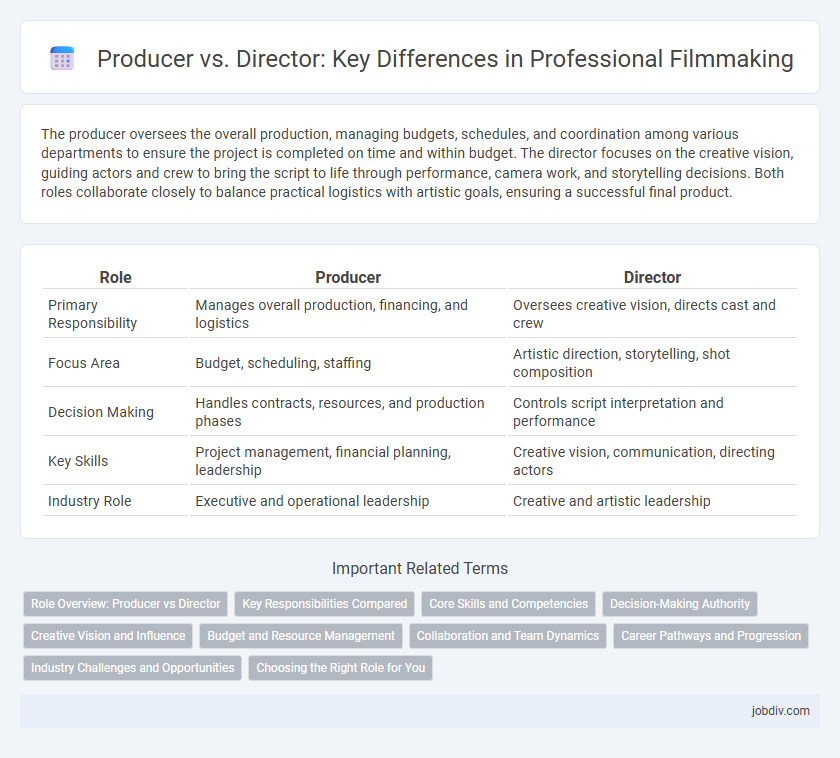The producer oversees the overall production, managing budgets, schedules, and coordination among various departments to ensure the project is completed on time and within budget. The director focuses on the creative vision, guiding actors and crew to bring the script to life through performance, camera work, and storytelling decisions. Both roles collaborate closely to balance practical logistics with artistic goals, ensuring a successful final product.
Table of Comparison
| Role | Producer | Director |
|---|---|---|
| Primary Responsibility | Manages overall production, financing, and logistics | Oversees creative vision, directs cast and crew |
| Focus Area | Budget, scheduling, staffing | Artistic direction, storytelling, shot composition |
| Decision Making | Handles contracts, resources, and production phases | Controls script interpretation and performance |
| Key Skills | Project management, financial planning, leadership | Creative vision, communication, directing actors |
| Industry Role | Executive and operational leadership | Creative and artistic leadership |
Role Overview: Producer vs Director
The producer oversees the overall project management, including financing, scheduling, and coordination among departments to ensure the film's completion on time and within budget. The director focuses on the creative vision, guiding actors and crew to translate the script into visual storytelling and shaping the artistic elements of the production. While the producer handles logistical and administrative responsibilities, the director manages the artistic and performance aspects.
Key Responsibilities Compared
Producers manage the overall production budget, financing, and scheduling to ensure the project stays on track and profitable. Directors focus on the creative vision, guiding actors and crew to fulfill the story, style, and artistic goals. While producers handle logistics and resources, directors oversee script interpretation, camera angles, and performance quality.
Core Skills and Competencies
Producers excel in project management, budgeting, and team coordination, ensuring the entire production process runs smoothly from inception to completion. Directors focus on creative vision, storytelling, and actor direction, translating scripts into compelling visual narratives. Both roles require strong leadership, communication skills, and the ability to solve complex problems under deadline pressure.
Decision-Making Authority
Producers hold ultimate decision-making authority over the financial, logistical, and administrative aspects of a production, including budget approval, scheduling, and hiring key personnel. Directors focus on creative decision-making, shaping the artistic vision by directing actors, selecting shots, and overseeing the visual storytelling. The producer's decisions ensure the project stays on track and within budget, while the director's choices bring the narrative and artistic elements to life.
Creative Vision and Influence
A director shapes the creative vision by interpreting the script, guiding actors' performances, and overseeing the artistic aspects of production. The producer influences the project through high-level decision-making, including financing, scheduling, and resource allocation, ensuring the vision is achievable. Collaboration between the director's imaginative leadership and the producer's strategic oversight drives the final artistic and commercial success of a film.
Budget and Resource Management
Producers oversee budget allocation and resource management to ensure projects stay within financial limits while meeting production goals. Directors focus on creatively utilizing allocated resources, translating the producer's budget into effective storytelling through scheduling and team coordination. Efficient collaboration between producers and directors maximizes resource use, balancing fiscal responsibility with artistic vision.
Collaboration and Team Dynamics
Producers and directors collaborate closely to ensure a project's creative vision aligns with budgetary and logistical constraints, fostering a cohesive team environment. Producers manage resources, schedules, and stakeholder communications, enabling directors to focus on artistic decisions and performance guidance. Effective collaboration and clear role delineation between producers and directors enhance team dynamics, resulting in a streamlined production process and a successful final product.
Career Pathways and Progression
Producers typically begin their careers in entry-level assistant roles, advancing by gaining experience in project management, budgeting, and networking within the entertainment industry. Directors often start as film students, assistants, or editors, honing creative and leadership skills through smaller projects before directing major productions. Career progression for producers centers on expanding organizational responsibilities, while directors focus on developing artistic vision and directing increasingly complex films or series.
Industry Challenges and Opportunities
Producers and directors face distinct industry challenges, with producers managing budgets, financing, and distribution complexities while directors concentrate on creative vision and talent coordination. Opportunities arise from evolving digital platforms that demand innovative content production and agile project management. Both roles require adaptability to changing market trends and audience preferences to ensure successful project completion.
Choosing the Right Role for You
Selecting the right role between producer and director depends on your strengths in creative vision versus project management. A producer excels in budgeting, scheduling, and coordinating logistics to ensure a production runs smoothly, while a director focuses on interpreting the script and guiding actors to fulfill the artistic vision. Understanding whether you thrive in organizational leadership or creative decision-making is crucial for career success in film and television production.
Producer vs Director Infographic

 jobdiv.com
jobdiv.com